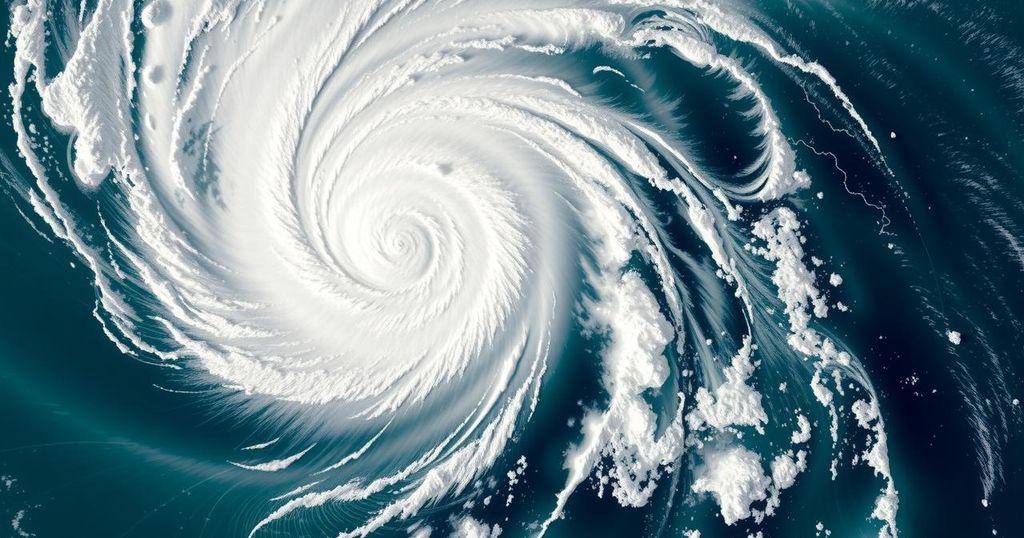Tropical Cyclone Chido wreaked havoc in Mayotte, with wind speeds exceeding 220 km/h, prompting extensive property damage and a declaration of red alerts for local residents. Mayotte’s Prefect highlighted the cyclone as the most destructive since 1934, while no immediate casualties were reported. The cyclone’s path suggests potential impacts on Mozambique and other southern African nations, already vulnerable to severe weather events due to climate change.
Tropical Cyclone Chido has caused significant destruction in Mayotte, a French territory in the Indian Ocean, as it heads towards the eastern coast of Africa. The cyclone’s winds surpassed 220 kilometers per hour, leading to extensive property damage, including the removal of roofs from homes in Mayotte’s populated islands. Although the situation is dire, there have been no immediate reports of casualties so far.
Mayotte’s Prefect, Francois-Xavier Bieuville, described this event as the most violent cyclone to strike the island since 1934, asserting, “Many of us have lost everything.” Following the cyclone’s peak, the highest alert level has been downgraded to facilitate rescue efforts. Residents, however, remain under a red alert and are advised to stay in robust shelters as the storm’s effects continue.
The French Interior Minister, Bruno Retailleau, has acknowledged the severe impact of the cyclone, stating, “The damages already appear to be extensive.” Power outages have affected thousands, and reports indicate significant destruction of smaller structures and widespread fallen trees. To reinforce rescue operations, an additional 140 personnel will be dispatched to Mayotte.
The storm is also impacting the Comoros Islands, where authorities are deeply concerned for eleven fishermen who have not returned since venturing out to sea. In response to the situation, Comoros has instituted strict maritime restrictions and closed the main airport and government offices. Schools were previously closed to allow residents to prepare for the cyclone.
As Cyclone Chido continues its path towards the mainland, it is projected to strike Mozambique late Saturday or early Sunday. Mozambique’s disaster agency has warned that approximately 2.5 million people in the northern provinces may be affected. Similarly, Malawi and Zimbabwe are anticipating adverse weather conditions and flooding, with authorities advising evacuation in high-risk areas.
The cyclone season, lasting from December to March in the southeastern Indian Ocean, has brought increased frequency and intensity of storms due to climate change. Earlier cyclones, such as Idai in 2019 and Freddy last year, caused substantial fatalities and humanitarian crises in the region, exacerbating public health risks from potential outbreaks of waterborne diseases following flooding events.
Although southern African nations have minimally contributed to climate change, they face the brunt of its devastating effects, reflecting the urgent need for global action to mitigate climate-related disasters.
Cyclone season in the southeastern Indian Ocean typically spans from December to March, during which time the region has witnessed a concerning increase in cyclone intensity and frequency attributed to climate change. Tropical Cyclone Chido exemplifies this trend, having inflicted severe damage in Mayotte and posing a significant threat to mainland Africa. Previous cyclones, such as Idai and Freddy, highlight the alarming humanitarian consequences of these storms, particularly in impoverished nations in southern Africa. The world must recognize the disproportionate impact of climate change on these regions, which contribute minimally to the problem yet endure catastrophic outcomes.
The passage of Tropical Cyclone Chido has resulted in extensive damage in Mayotte, with ongoing threats to the eastern coast of Africa. While local and national authorities mobilize resources for disaster response, the trajectory of Chido emphasizes the critical vulnerability of regional populations to cyclonic events exacerbated by climate change. The situation in Mayotte and the surrounding areas underscores an urgent call for global solidarity to address climate change and its severe humanitarian repercussions.
Original Source: www.voanews.com






